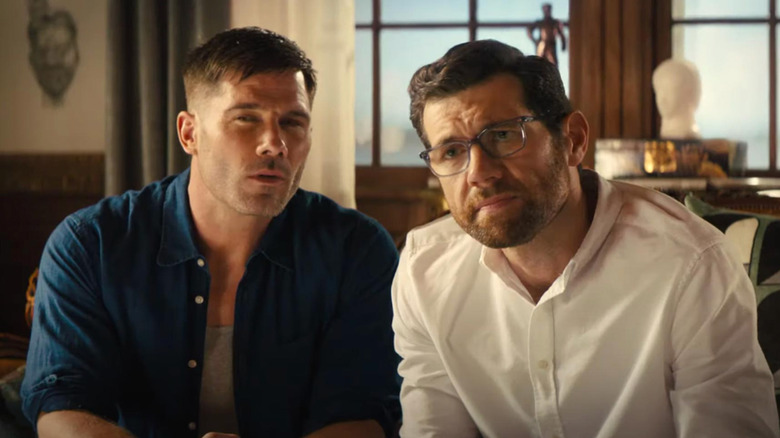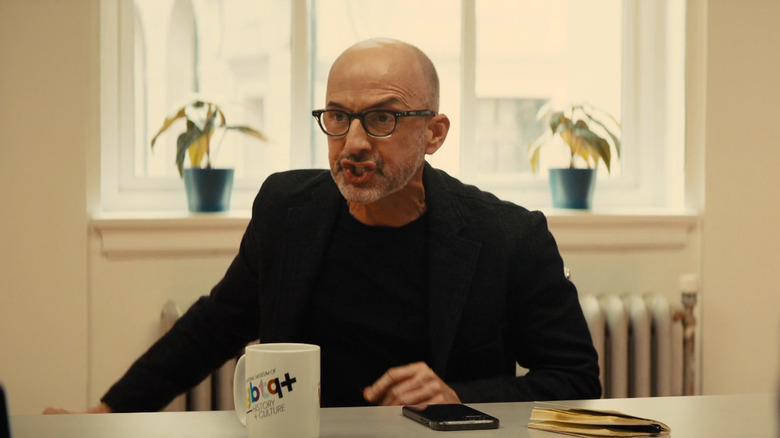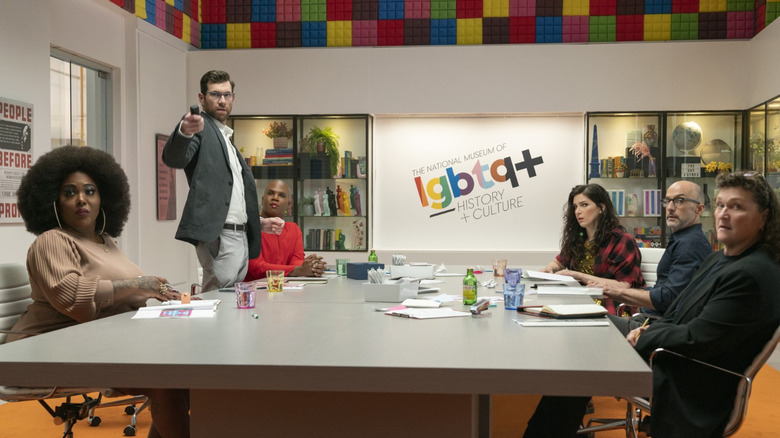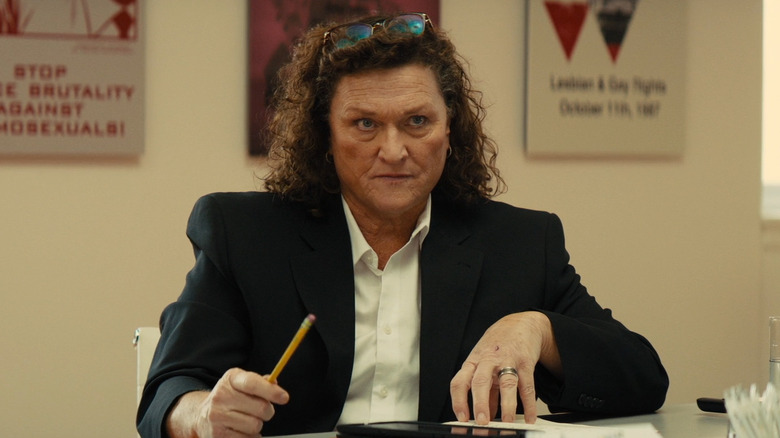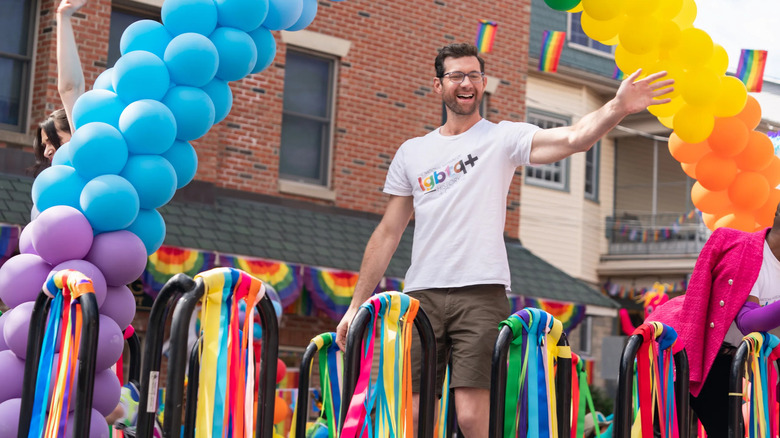The Cast Of Bros Talks Improv, On-Set Therapy And Sacred Queer Texts [Exclusive Interview]
After months of anticipation, the wait for "Bros" is finally over. Billy Eichner is officially off the streets and in the sheets, falling in love and mining a budding romance for all the comedy gold that it's worth. The rom-com sees Eichner starring opposite Luke Macfarlane as two men who fall for one another despite sharing very little in common. As they navigate the complexities of admitting that they may be in an actual relationship, Eichner's character Bobby is also in the midst of a major career development, as he attempts to find funding for a museum dedicated to LGBTQ+ history.
While the movie toes the line between subverting genre tropes and also delivering a very sweet love story, it also acts as a love letter to the larger LGBTQIA community. The bulk of the cast — including the smaller, supporting roles — is filled out by LGBTQ+ performers, including seasoned actors like Dot Marie Jones ("Weird: The Al Yankovic Story," "Glee") and Jim Rash ("Community"), as well as stars on the rise, like actress/model Eve Lindley, who you may recognize from roles in "After Yang," "Mr. Robot" and more.
For Dot Marie Jones, there's no understating the significance of "Bros," and its approach to casting. A working actress for nearly 30 years, Jones has played every iteration of a lesbian side character under the sun — but rarely in a story that gives the spotlight to the entire LGBTQIA community. "For my being in the business for so long, there's [usually] maybe one, maybe two gay characters in a film or show," Jones said in an exclusive interview with /Film. "When we got to the point where the whole cast was LGBTQ, it was like, 'Oh my God, this is going to be huge.' And I believe it's even bigger than I anticipated."
That's just one piece of the puzzle though — the real selling point for "Bros" is that it's a joyously hilarious experience, as evidenced by /Film's conversation with Jones, Rash, and Lindley, which you can read below.
(This interview has been lightly edited for clarity.)
'It's even bigger than I anticipated.'
For each of you, I'd love to hear how "Bros" was brought to you and what it meant for you, personally, to join the cast and be part of this movie.
Eve Lindley: Well, for me, it was just a run-of-the-mill audition. I was super excited about everybody who was involved. I've loved Billy for such a long time. It wasn't until much later that the monumental, groundbreaking element became part of it. But yeah, I was just pounding the pavement when I got the audition.
Jim Rash (above): And Dot, our stories are going to overlap a little bit.
Dot Marie Jones: I know. Whatever Jim says.
Rash: Well, we'll talk about the impact for us individually, but I'll give the header. Dot and I were in a table read for it, very early stages, pre-pandemic, pre-shutdown. We weren't attached. A lot of times, actors show up and read just to hear. I think we read multiple things, including our characters. So, I don't know. I can't speak for Dot, but I didn't know exactly what... I knew that what we were reading was hilarious. A lot of it's still the same. There was different stuff. But that was before he proclaimed their idea that this whole cast would be LGBTQ in primary, plus a lot of members on the crew. So it became more special as it unfolded for me. It was important to me, just in that very simplicity of reasons.
Jones: For me, like Jim said, when we were at the table read... the script is hysterical. And there's so many characters in it. I just remember it reading so fast.
Rash: Yeah.
Dot Marie Jones: But we were still laughing. There was a lot of comics in there, reading for different roles and stuff. When you do something like that, you never know if they're going to actually bring you back or ask you to do it or what happens. Then when I got it and reread the whole script myself, as opposed to doing just what they wanted me to, it was, "Oh my God, this is amazing. And it's something I've never read. Something different."
It's not like a do-over. It's not your typical, well, I shouldn't say "typical." But for my being in the business for so long, there's [usually] maybe one, maybe two gay characters in a film or show. And when we got to the point where the whole cast was LGBTQ, it was like, "Oh my God, this is going to be huge." I believe it's even bigger than I anticipated.
'There was a lot of heart and support.'
So even that early on, the script was really fast-paced, really snappy, and it definitely feels that way in the movie. But it also feels really organic and very much how people talk to each other. Was there a lot of improv involved in those museum board scenes or...?
Jones: Jimmy?
Rash: All of us.
Jones: Yeah, all of us.
Rash: Eve would throw them out fast. It was very collaborative. But the main thing, too, is that we shot the script first and foremost, because that was gold. Then everything after that was just in the collaborative spirit of the moment, things happen. Our characters come to live as we, for the first time, sit at that actual table. So you don't want to miss those opportunities. They were also flying in ideas. Billy would go into his head after each take and play out, not just funny, but play out story, play out, "Are we taking care of these characters?" Comedically, yes. But are we taking care of them? I think that was a big difference.
Jones: Absolutely. I think so. Plus, in the movie, I feel like there's not just the hilarity that ensued, but there's so much heart. Heart and support over all the fighting and stuff that we did. There was a lot of heart and support.
I was definitely thinking about that. There's a lot of bickering in those scenes and a lot of everyone taking control of what the museum's going to have. But there's also that core of love between all of those characters.
Rash: That fighting was coming from a real place. We had to work out some issues as actors. So you want to capture all of that.
Lindley: They had to bring a therapist in just for us.
Jones: And a wrestling rink.
Rash: [Laughs] Yeah. We got physical.
Were there conversations with Billy and with Nick about that collaborative process? Or is that something that just happened in the moment?
Jones: It's more yelling, don't you guys think?
Lindley: Yeah, Dot threw a chair out the window. [Laughs] No, no. There was a lot of back and forth and, "Oh, if I say this, then you could say that." And it was —
Jones: There was a lot of, "Try this, try this."
Rash: Yeah. I think we showed up on day one, and they had already set that as an understanding. I think there was no point where we felt shy to throw something in. And I think that's the beauty of that process.
'I don't want to give anything away, but it's very thought-provoking and it makes you want to cry.'
There are a million jokes in this movie that feel very therapeutic to hear someone else making fun of the thing that we've all been living through. Was there a joke or a theme for each of you that you heard or you read in the script and you were like, "Finally, someone said the thing"?
Rash: Oh God.
Lindley: The Caitlin Jenner joke is pretty...
Jones (above): That was hysterical.
Lindley: It's pretty exciting to me, yeah. That's one that I hear a lot of people saying, "Oh, somebody finally said it." So I like that one.
Rash: I thoroughly enjoyed the character of Steve and that whole sequence. And the guy coming in and saying, "Oh, hi, Steve," with judgment, told me everything I needed to know about this man's existence within this group. I loved it.
Jones: It was hysterical.
Rash: Hysterical. I was not prepared for that. I was still giggling afterwards. But I will say, and I know this is more the emotional stuff, but hearing Billy's speech in P-Town, to me, was... Everyone feels that. But for me in particular, I was, "Oh my God. I could give this speech in my own words." But I think that's where you know you've truly tapped into something that's beyond the comedy. That, to me, is so important.
Jones: God, there's so many. But what Jim said about that speech that Billy gives in P-Town, that can resonate with anybody, not just a gay man. I took from that a lot of things that... I don't want to give anything away from the speech, but it's very thought-provoking, and it makes you want to cry. Because I cried, of course. I always cry. But I cried watching the movie, seeing that on screen for the first time. Again, there are so many messages, along with the humor. There are so many heartfelt messages in this film that I hope people get and I hope they can resonate with some of these characters.
For me, my "Finally, someone said it" moment was the joke that they make about "Glee." Which, I love the meta layer of you being there, Dot.
Jones: Oh, is that a show? [Laughs] It was funny because the first time I heard it, I'm like, "Oh God, I forgot that was in there."
'This is something that maybe a lot more people can resonate with.'
I feel like, for me and a lot of people around my age, that was the core queer text that we had to latch onto. And I'm curious, for each of you, what was yours? Or what was the one that you had on screen at the time?
Lindley: Oh, mine was definitely "Glee." I still love "Glee" to this day. But for my parents, it was really important for them to see. Because I think my dad watching the dad of Chris Colfer, standing up for his child that came out, was kind of a big one. So, "Glee" is a sacred text to me for sure.
Rash: Well, obviously, I appreciate "Glee." But I do remember... I think it's... I might be wrong on the year, but '94. But the '90s, when you have "Will & Grace." I remember listening to them talking about the fears of that show. Then I think whoever was head of NBC was, "Well, worst case, we have a bad pilot, but let's make the pilot." And so I think that show. But "Glee" as well. I think all these shows build on each other. And they're targeting more than just the generation that was there.
Jones: Yeah. Absolutely. "Will & Grace" is amazing. But going back to when I was a kid, the only gay character that I really remember was played by Billy Crystal on "Soap." And it never delved into these heavy, emotional things. It was always, in a sense, a joke. That's one thing I'm very proud of with "Glee" is that I feel like [creator] Ryan [Murphy] hit every demographic that he could possibly hit to represent in the LGBTQ community. And now "Bros," instead of different episodes over six seasons, they brought it together in less than two hours.
We're all there, and we're all together. And it's all amazing, and it's all monumental. But "Bros" being a rom-com — a specific genre that has basically, our whole lives, been straight couples — and now that it's gone LGBTQ, this is something that maybe a lot more people can resonate with. If one person says, "You know what? It made me okay with myself. I was able to laugh at myself and not fear and not have these awful black thoughts and go to these dark places."If one person can get that in this film, then I believe a lot of people will get it.
"Bros" arrives in theaters on September 30, 2022.
